As King Charles III approaches throne at CST, moral crisis and iambic pentameter engulf him
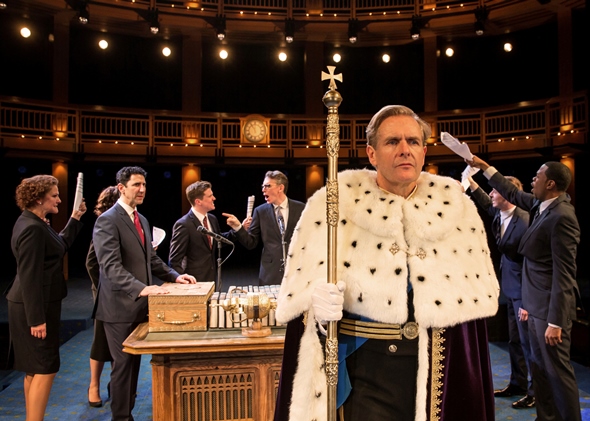 Review: “King Charles III” by Mike Bartlett, at Chicago Shakespeare Theater through Jan. 15, 2017. ★★
Review: “King Charles III” by Mike Bartlett, at Chicago Shakespeare Theater through Jan. 15, 2017. ★★
By Lawrence B. Johnson
Mike Bartlett’s fanciful play “King Charles III,” a hypothetical screed in which Britain’s Elizabeth II has died and her son Charles is ready to succeed her, involves a substantial cast of characters declaiming in iambic pentameter, the familiar ba-BUM pulse of Shakespeare’s stage works.
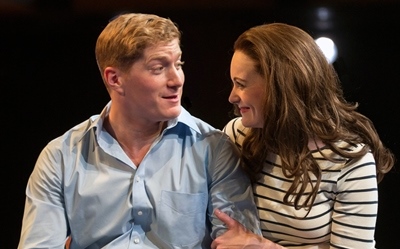 Not very far into this enterprise directed by Gary Griffin at Chicago Shakespeare Theater, I found myself wondering how it all might work telescoped into a monodrama and spoken – not declaimed, heaven help us – by Robert Bathurst, the king in waiting here and the one actor in view who seemed to understand that blank verse is not speech set to the head-pounding of a jackhammer.
Not very far into this enterprise directed by Gary Griffin at Chicago Shakespeare Theater, I found myself wondering how it all might work telescoped into a monodrama and spoken – not declaimed, heaven help us – by Robert Bathurst, the king in waiting here and the one actor in view who seemed to understand that blank verse is not speech set to the head-pounding of a jackhammer.
Were THIS reVIEW to READ the WAY Mike’s PLAY
Was WROUGHT by GAry’s GANG, the READer SURE
Would SURF aWAY to SPARE a BLUDgeon’d BRAIN.
Drop the egregious emphasis, and you still have the built-in iambic “feet,” five to the line. Similarly, with little more inflection than the natural impulse of astonishment, read aloud Christopher Marlowe’s famous couplet from “Doctor Faustus”:
Was this the face that launch’d a thousand ships
And burnt the topless towers of Ilium?
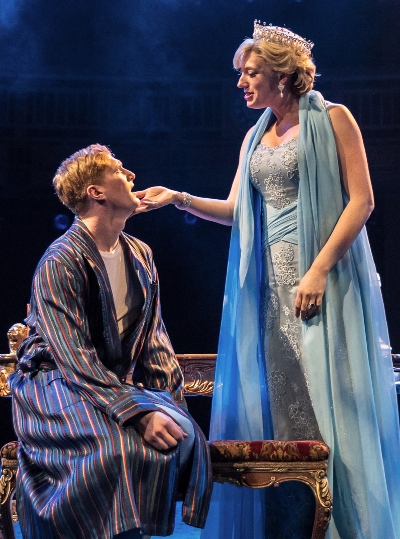 I’m hammering (apt word) on this because I found the play itself to be a fairly thin contrivance, and made to sound ridiculous, almost a tongue-in-cheek sendup, by a clutch of reciters who harangued their lines as if they’d never had a brush the Bard himself.
I’m hammering (apt word) on this because I found the play itself to be a fairly thin contrivance, and made to sound ridiculous, almost a tongue-in-cheek sendup, by a clutch of reciters who harangued their lines as if they’d never had a brush the Bard himself.
Then there were the exit couplets, and this is all on the playwright. It’s a standard Shakespearean device. At the end of a scene, a character may deliver a rhymed couplet that sums up the situation or points us forward. Here, in “The Merchant of Venice,” Antonio reassures his needful friend Bassanio that the latter’s appeal for a loan can be safely satisfied:
Come on: in this there can be no dismay;
My ships come home a month before the day.
This is a perfect rhyme, but Bartlett’s exit couplets often fall back onto approximate rhymes, a lazy recourse that rarely if ever occurs in the verse of a sharp-penned poet like Shakespeare or, say, Stephen Sondheim. But it’s just one more sign of a loosely stitched fabric that does not hold much water.
The play itself sets forth an intriguing twist on the ever-receding kingship of Prince Charles. In Barlett’s narrative, the queen has died and Charles’ coronation is seen as essentially pro forma. Meanwhile, Parliament proceeds with its work making laws and, even before he can be enthroned, Charles must affix the royal signature to each new statute. But the very first one that comes under his pen spells the curtailing of freedom of the press. While no one has felt the gossipy sting of the British press more keenly than the royal family, Charles hesitates to sign a law that seems to fly in the face of a fundamental tenet of democracy. Indeed, he won’t set his hand to it.
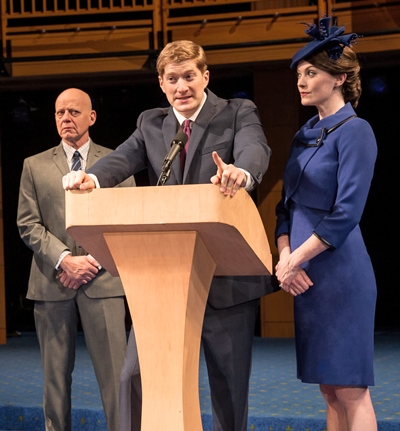 The prime minister (Sean Fortunato) is agog. Never in her record-long monarchy, he observes, did Elizabeth II once refuse to sign off on a law enacted by duly elected representatives of the people. But Charles is intractable. This law would be an affront to all that Britain stands for, he says, and he will not lend it his imprimatur.
The prime minister (Sean Fortunato) is agog. Never in her record-long monarchy, he observes, did Elizabeth II once refuse to sign off on a law enacted by duly elected representatives of the people. But Charles is intractable. This law would be an affront to all that Britain stands for, he says, and he will not lend it his imprimatur.
Bathurst cuts a stately figure of experience and conviction as Charles – to which he adds an endearing soupçon of befuddlement. It’s also a pleasure to hear him respondswith reason and equanimity to the increasingly indignant prating, and ultimate riotous clamor, of a Parliament and a public virulently set against him.
Charles’ sons, the heir-apparent William (Jordan Dean) and the carousing young Harry (Alec Manley Wilson), initially stand by their father. But when the prime minister points out how the whole institution of monarchy could founder if Parliament simply decides to cancel the tradition of royal approval, William and Harry begin to see their future in a different light. And then there’s William’s wife Kate (Amanda Drinkall), who envisions her name in lights: Queen Catherine.
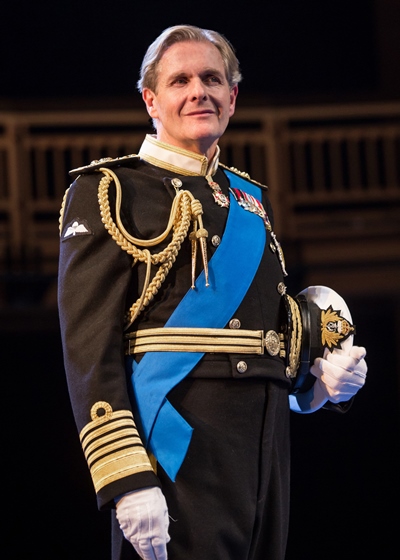 Borrowing a spice from “Macbeth,” Bartlett stirs in the ghost of Charles’ first wife, Diana (Sarah Chalcroft), who rather like the weird sisters informs Charles that he will be the greatest of kings – then tells his son William (her son, too, by the way) that he will be the greatest of kings. Can you see where this is going?
Borrowing a spice from “Macbeth,” Bartlett stirs in the ghost of Charles’ first wife, Diana (Sarah Chalcroft), who rather like the weird sisters informs Charles that he will be the greatest of kings – then tells his son William (her son, too, by the way) that he will be the greatest of kings. Can you see where this is going?
For one of these men, the whole business is lurching toward a sorry end. Actually, in Griffin’s staging, the play concludes with a sort of blue-blooded sit-down protest. I can’t decide whether the ending is bittersweet or darkly comical. Tragic, it is not. Maybe what we have here is a domestic comedy that doesn’t travel well, set in a culture whose monarchical tradition is simply foreign to us on this side of the pond.
Or it could be a morality play, the lesson an old one: Beware ghosts spouting enigmas in iambic pentameter.
Related Links:
- Performance location, dates and times: Details at TheatreinChicago.com
- Preview of Chicago Shakespeare Theater’s complete 2016-17 season: Read it at ChicagoOntheAisle.com
Tags: Alec Manley Wilson, Amanda Drinkall, Chicago Shakespeare Theater, Gary Griffin, Jordan Dean, King Charles III, Mike Bartlett, Robert Bathurst, Sarah Chalcroft, Sean Fortunato

